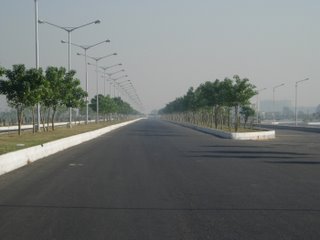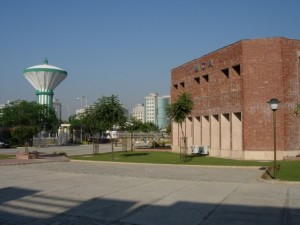I hadn’t heard of Noida before hearing that I’d be staying there for a week in November. The overnight from London to Delhi was enough to let me sleep most of the way from the airport to Noida’s YMCA, so it was a surprise to wake up on arriving at a new, empty facility–both the city and the Y, as it’s affectionately known.
Greater Noida has a five-year plan to fulfil the dream of a former chief minister of Uttar Pradesh, a woman whose village home was Noida. The greater city rises from a dusty plain of sandy soil, is linked to Delhi by a fine highway, is growing, but has acres of empty plots and dozens of empty high-rise buildings. Crossing the road was hazardous, not for the volume of traffic, but for the locals’ habit of using both sides of the dual carriageway as single carriage roads; there are rules for roundabouts (circles), I expect, but it was hard to predict how any one vehicle would move round the large roundabout that lay between the Y, the pizza house and the Internet cafe. Lorry drivers apart, most did attempt to steer round pedestrians, though some motor cyclists thought it fun to buzz the feckless, just like WWII fighter pilots or modern-day Israeli jets over Beirut.
 The Internet cafe was three floors up and provided an hour’s access to the world for Rupees15, US$0.30 or £0.17. The pizza house was bright, loud, hot and sold good value, piping hot food. At the end of this stretch of road, to the right, lies a village of labourers; no electricity that we could see, but the road was lit to highest standards with high-pressure sodium lamps. Just before 10 PM, walking back along this road I tried (and failed) to compute and compare the nightly cost of lighting the road with the daily hire of the truck-load of labourers returning to their temporary village. Their main fuel is the hand-crafted, pizza-shaped cowpats neatly laid in lines to dry. The air left one smelling of the smoke; the street lights shone on, oblivious to emptiness or global warming.
The Internet cafe was three floors up and provided an hour’s access to the world for Rupees15, US$0.30 or £0.17. The pizza house was bright, loud, hot and sold good value, piping hot food. At the end of this stretch of road, to the right, lies a village of labourers; no electricity that we could see, but the road was lit to highest standards with high-pressure sodium lamps. Just before 10 PM, walking back along this road I tried (and failed) to compute and compare the nightly cost of lighting the road with the daily hire of the truck-load of labourers returning to their temporary village. Their main fuel is the hand-crafted, pizza-shaped cowpats neatly laid in lines to dry. The air left one smelling of the smoke; the street lights shone on, oblivious to emptiness or global warming.
4 December, 2006
